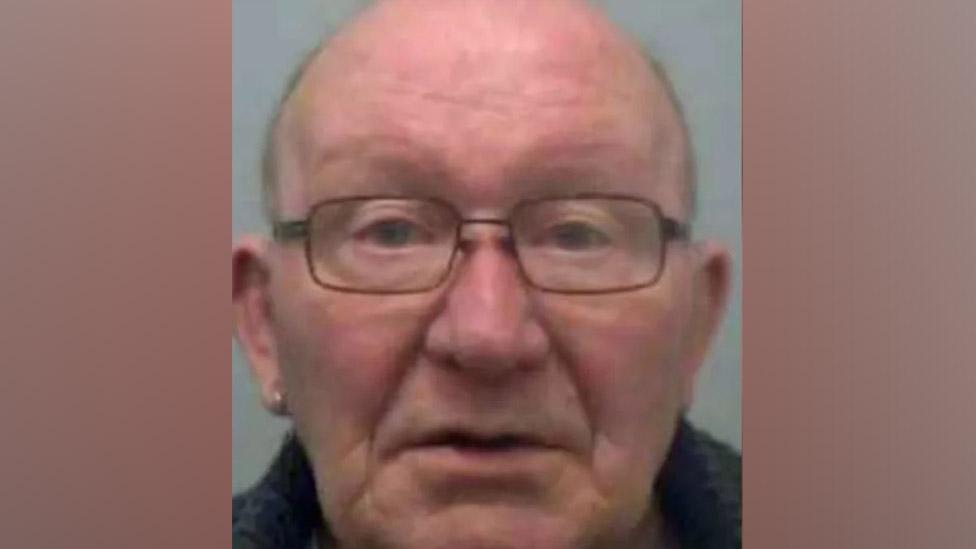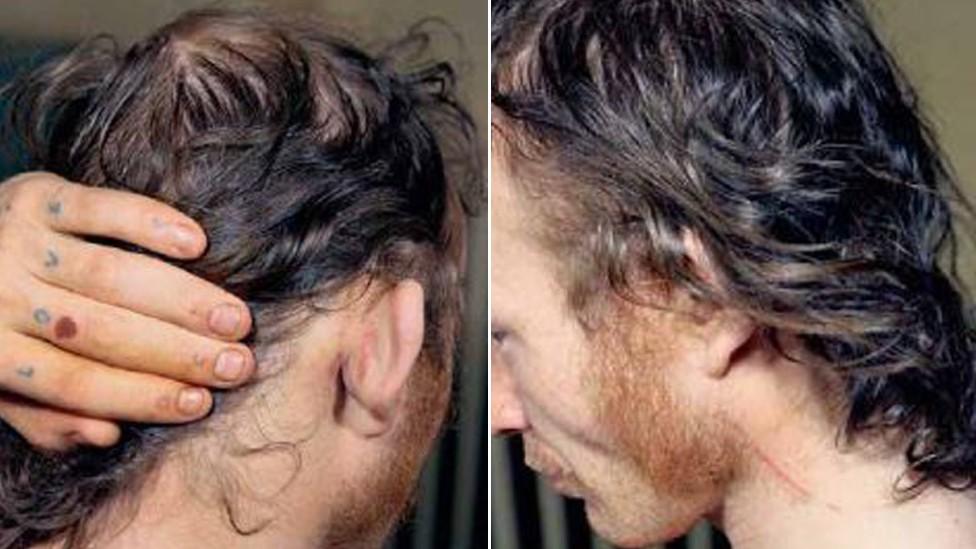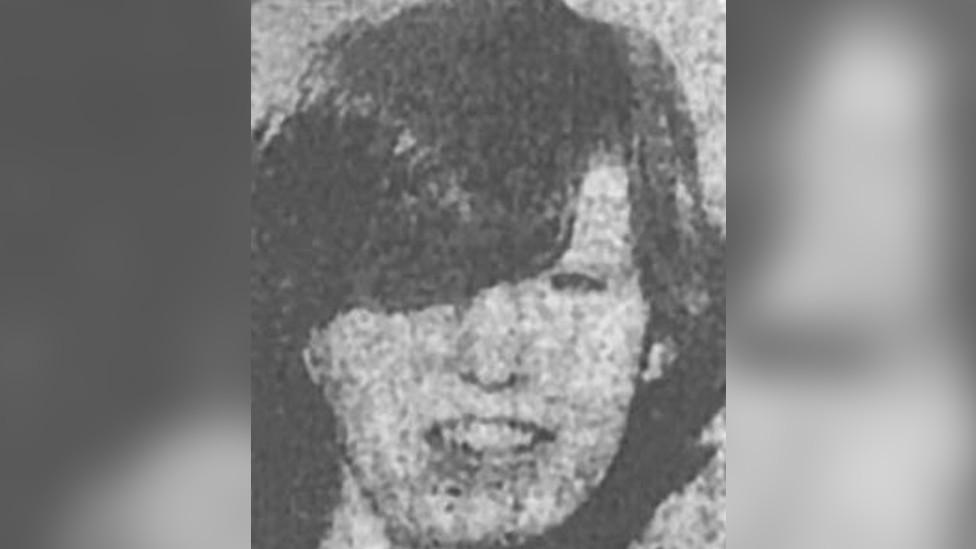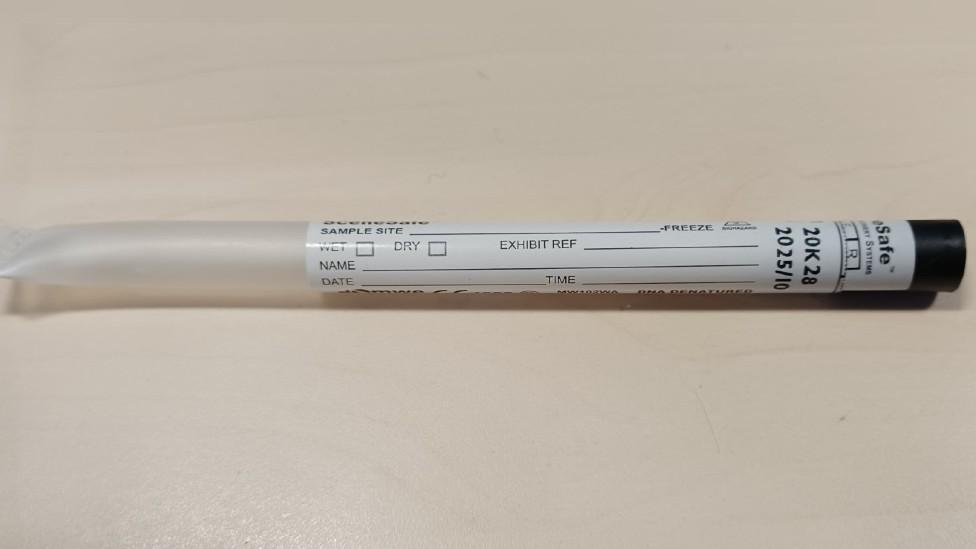Man guilty of murder and rape in oldest double jeopardy case
- Published

Dennis McGrory was found guilty after he raped, stabbed and strangled a 15-year-old girl in 1975
A man who brutally raped and murdered a teenager almost 50 years ago in the oldest double jeopardy case in England and Wales has been found guilty.
Dennis McGrory was 28 when he sexually assaulted, stabbed and strangled 15-year-old Jacqui Montgomery in her home in Islington, north London, in 1975.
McGrory was tried on a circumstantial case but was cleared of murder in 1976.
He was summoned again after swabs from Ms Montgomery's body made a one-in-a-billion DNA match decades later.
Huntingdon Crown Court heard how the girl's body was found by her father, Robert Montgomery, in their living room in Offord Road on 2 June 1975.
She had suffered fatal stab wounds, blunt force trauma to her face and was strangled with the flex of an iron.
Jurors were told McGrory had been "wild with rage" when he killed the teenager as he tried to track down his ex-partner Josie Montgomery, who was the victim's aunt.

The CPS released images from the day after the murder, which shows Dennis McGrory with cuts and bruises behind his ears and on his hands
Prosecuting, Sarah Przybylska said: "No doubt furious with rage and wanting to attack Josie, the defendant took out his anger on the next best thing, Jacqui Montgomery, both raping and murdering her."
During the attack, he ripped out a page of the teenager's diary with her aunt's address on it.
McGrory had threatened to rape Jacqui in the past and, on that night, he "made good" on those words, jurors were told.
Following a 2003 change in the law on double jeopardy, which meant that retrials could take place if new and compelling evidence came to light, McGrory's case was referred to the Court of Appeal and sent for a fresh trial at the Old Bailey.
That trial, in March, was halted when McGrory, of Milton Keynes in Buckinghamshire, fell ill.
Extremely serious case
He appeared for his retrial at Huntingdon Crown Court by video link and was found guilty of rape and murder.
Max Hill KC, director of public prosecutions, hailed the guilty verdict, saying: "This crime took place a full decade before the Crown Prosecution Service (CPS) opened its doors so it's certainly the oldest case that I've encountered.
"It is one of the very small handful of double jeopardy cases that I've personally authorised to be taken to the Court of Appeal.
"It is an extremely serious and rare step to ask the Court of Appeal, as I did, to set aside an acquittal for murder, whether that acquittal took place five years ago or 50 years ago," he added.

Jacqui Montgomery suffered fatal stab wounds, blunt force trauma and was strangled with the flex of an iron
Mr Hill praised the "excellent" work of the police and CPS in bringing McGrory to justice.
He described it as a "particularly vicious murder" where a sexual assault was part of the "murderous attack".
"That meant that on further investigation, we were able to prove that there was a scientific link between McGrory and the body of Jacqueline Montgomery.
"His DNA was found on her body in circumstances where he denies to this day that he was even at the scene or at the house in which she was murdered.
He said it formed new evidence in addition to finding a page torn from Ms Montgomery's diary.

DNA swabs from Ms Montgomery's body made a one-in-a-billion match
"When you put those two elements together, it became impossible for him to explain his possession of the diary page and the DNA sample that he left on this poor girl's body in any way other than him being present and being the killer himself," Mr Hill added.
"I'm sure that this individual McGrory believed that he had gotten away with murder," Mr Hill continued.
"But since the double jeopardy principles were enshrined in statute in 2003, I and my recent predecessors have had the ability to try to put matters right," he said.
Mr Hill said "although these cases are rightly rare", the message was "the system will catch you in the end".
Acting Det Supt Rebecca Reeves described the murder as an "extremely brutal attack" and said she hoped the conviction would bring Ms Montgomery's family "some element of comfort".
"This has been an extremely challenging investigation lasting a number of years," she said.
'Violent bully'
Det Supt Reeves praised the family members who gave evidence in the trial for being brave "because McGrory was a violent bully who terrified the women in his life and that impact, that influence, was something that some of them still felt today".
Claire Prodger, from the CPS, said McGrory had "finally faced justice for his murderous actions" after "selfishly and brutally" ending the teenager's life.
The jury deliberated on Monday for just over an hour to find McGrory guilty on both charges against him.
McGrory was remanded into custody to be sentenced on 13 January.

Follow BBC London on Facebook, external, Twitter , externaland Instagram, external. Send your story ideas to hellobbclondon@bbc.co.uk